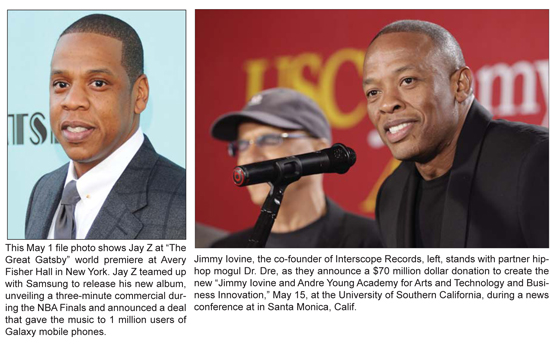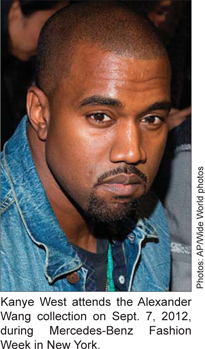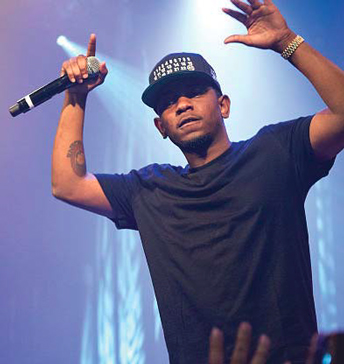Celebrity accountability: Should it matter to Black America?
By Charlene Muhammad -National Correspondent- | Last updated: Nov 19, 2013 - 11:08:53 AMWhat's your opinion on this article?

|
(FinalCall.com) - Star power, social responsibility and controversy surfaced again over a partnership between hip hop entrepreneur Jay Z aka Shawn Carter and a high end store accused of racially profiling customers and rapper-businessman Kanye West’s appropriation of the Confederate Stars and Bars flag for a clothing line.
Jay Z issued a statement Nov. 15 defending his decision to keep his product line partnership with Barney’s, despite lawsuits alleging the New York store racially profiled Black customers. One customer was arrested after using his own credit card to purchase a $350 belt.
“The easy position would have been to walk away and leave policy making to others hoping that someone addresses the problem. I will not leave the outcome to others. I will take this into my own hands with full power to recommend, review and revise policies and guidelines moving forward,” said Jay Z, in the mid-November statement posted to his website.

Any energy is good energy. You know the Confederate flag represented slavery in a way—that’s my abstract take on what I know about it. So I made the song ‘New Slaves.’ So I took the Confederate flag and made it my flag. It’s my flag. Now what are you going to do?” —Kanye West |
“As I previously stated, the collaboration with Barneys has always been about giving and The Shawn Carter Foundation. From this collection, the Foundation will receive not only 25 percent of sales, it will now receive the additional 75 percent of Barneys’ sales, totaling 100 percent of all sales from BNY SCC. Along with 100 percent of sales from the collaboration, the Foundation will receive an additional 10 percent of all retail sales from Barneys New York stores nationwide and Barneys.com on November 20th,” said Jay Z.
His Shawn Carter Foundation grants scholarships to single mothers, children in alternative schools, and others who generally don’t receive scholarships.
Kanye seemed less concerned about negative opinions during a recent radio interview in which he discussed the backlash. “Any energy is good energy. You know the Confederate flag represented slavery in a way—that’s my abstract take on what I know about it. So I made the song ‘New Slaves.’ So I took the Confederate flag and made it my flag. It’s my flag. Now what are you going to do?” he asked.
As entrepreneurs and brands connect with American corporations, should these rappers and other celebrities feel any sense of social responsibility?
Kanye, Jay Z and celebrities must understand there is a duty Black people and Black America must act on to make the young capitalists understand that, argued Dr. Ron Daniels, president of the Institute of the Black World 21st Century, which is devoted to the social, political, economic and cultural upliftment, and development of the global Black community.
He doesn’t inherently have problems with partnerships. But with the loss of Black ownership in major entities like Black Entertainment Television and Essence Magazine, a problem exists, he argued. Blacks need to independently own influential entities, Dr. Daniels said.
“The other issue for me in terms of celebrity accountability and responsibility, which to me is so incredibly important, and we almost need an offensive around this, because for someone, an icon, like Kanye, who is so apolitical that they would go around and have merchandise in which they actually pedal the Confederate battle flag? I mean no self-respecting Jewish entrepreneur would allow his young people or anybody else to have paraphernalia that had a swastika on it. They just wouldn’t do that,” Dr. Daniels said.
“They tell me that Jay Z is worth a half a billion. Well, when you reach that level who can hurt you? ... And that even makes it more problematic because now you’re entering into a business deal that, do you need the money?” Dr. Daniels asked.
Dr. George Fraser, CEO of FraserNet Inc., which works to increase opportunities, wealth and jobs for Blacks, said Blacks should socially isolate and ostracize those who don’t give back and reinvest in their own community and a lack of consciousness remains a problem for celebrities and their fans.
“So you could be a millionaire athlete or entertainer, rap singer or whatever it is. Don’t give a dime back to your own people and we still love on you. We still buy your records. We still hug you. We want to take pictures with you. We want your autograph and you don’t do a goddamned thing for your people,” he said.
While Jay Z would undoubtedly be hurt and lose millions if he cancelled the Barneys deal, it’s the right thing to do, and would frankly bump his image up, Mr. Fraser continued. Canceling would hold Barneys accountable for their alleged discriminatory treatment of Blacks and would scar their image, he argued.
The Barneys deal could move forward despite protests because Blacks are divided and therefore conquered, Mr. Fraser said.
He sees a similar lack of consciousness with rapper-music producer Dr. Dre and music producer Jimmy Lovine donating $70 million to the University of Southern California and nothing to historically Black colleges. Black colleges are dying as seen recently with the financial crisis caused in part by budget cuts facing Grambling State University in Louisiana, he pointed out.
“This is a brother that’s made his money selling Black cool and off the backs of Black people and White people ... but not to have the consciousness to say, ‘Okay. I’m going to give some of my money to a White college that happens to be in my neighborhood in the Compton area of Los Angeles ... I’m also going to give some of my money to the institutions that provided higher education to Black people when White people wouldn’t educate us, and institutions who are struggling to stay alive.’ It wasn’t either or—he could have done both.”
A knowledge of self and business is needed
“As Minister Louis Farrakhan states, no individual in his success, is the byproduct of their individual activity so all of us represent a ‘we’ or an unseen community that has shaped and produced us, invested in us, or in some way contributed to our evolutionary growth,” commented Cedric Muhammad, a monetary and political economist, author, and member of the Nation of Islam Research Group.
The capitalist system, however, places free market transactions above the condition of the community that makes up the market, Mr. Muhammad explained.
Celebrities engage in three-way relationships, acting as an important bridge between the corporate partner and consumers in their community, he continued.
“They (celebrities) don’t have the most responsibility from the condition of the community, nor the most responsibility to set policy at the corporation level but they have the most responsibility to be truthful in representing what is going on in the three-way relationship,” Mr. Muhammad told The Final Call.
Corporate accountability boils down to whether companies are being truthful about their offerings and their short and long term motivation, meaning will the community be injured after the entity gets what it wants, he said.
“Now we will not produce accountability until there’s greater knowledge of economics and the business process of the corporation by the community. So I do support the community having ownership stake in the companies with which they do business,” said Cedric Muhammad.
“Minister Farrakhan in ‘Torchlight for America’ advocates employee ownership of corporations and he has advocated in recent years that the community be given ownership as members of the labor force and the community from which the labor force comes.”
Mr. Muhammad added, “I think accountability comes from honesty. It comes from a knowledge of self and a knowledge of the one across the table from you.”
Some artists appear to be gaining the courage to stand up to the corporate goliaths.

Kendrick Lamar
|
“This week, Kendrick Lamar was named one of GQ’s 2013 Men Of The Year, an honor that should have been celebrated as a milestone in his career and for the company. Instead, the story, written by Steve Marsh, put myself and my company in a negative light. Marsh’s story was more focused on what most people would see as drama or bs. To say he was ‘surprised at our discipline’ is completely disrespectful,” wrote Mr. Tiffith in a statement. “While we think it’s a tremendous honor to be named as one of the Men Of The Year, these lazy comparisons and offensive suggestions are something we won’t tolerate. Our reputation, work ethic, and product is something that we guard with our lives.”
Kendrick Lamar was supposed to perform at a Nov. 12 celebration party sponsored by the magazine, however, he declined to perform.
Another prominent artist, Atlanta-based T.I. also raised questions about how the power brokers in the industry respond when artists don’t maintain the image that keeps the dollars flowing into their coffers. In widely published comments, the rapper, known for his street-wise, hustling, money making lyrics and persona adopted a more “family friendly” image with a reality television program that showed a family oriented side previously unseen by the public and unexplored in his albums. He said his label Atlantic Records hated the “new” image.
“Labels love hardcore T.I. That keeps the cash register ringing. They don’t want me to go to prison and caught, though. They want me to be the ‘Teflon Don,’ and I can’t blame them,” he reportedly told XXL Magazine. “But I’m older, man. I’m wiser, I’m calmer,” he added.
The mainstream media was quick to report when T.I. experienced legal problems, however, not as vigorous is their coverage of his new image, nor his previous philanthropic work and charitable outreach through The King Foundation.
Good celebrity citizens rare?
Many cited Earvin “Magic” Johnson, former NBA player turned businessman, and others as good models of celebrities doing the right thing, making money and investing in their people but said such stars are the exception, not the rule.
George Curry, an editor, columnist and publisher of The Curry Report, thinks society places too much energy on celebrities, who are well known simply for being well known. Still, he said, they have an obligation to use their skills and power to help their people, just as others did before.
“Look at the few who actually got involved in the civil rights movement. Harry Belafonte was an exception. Dick Gregory was an exception. People who stood up for civil rights like Bill Russell, they were exceptions. Most of them ran in the opposite direction ... They’re rare,” Mr. Curry said.
According to Dave “Davey D” Cook, a California-based hip hop journalist, celebrity once meant a person had a platform with the potential to be a leader and was influential because of their visibility.
But that meant a certain expectation to uphold values that could be emulated by those who weren’t celebrities, he said. Today celebrity takes different forms and a certain mindset—stars are chosen because they’re not going to rock the boat, Davey D told The Final Call.
Energy going after wayward celebrities would be better spent elsewhere, such as highlighting those who are doing the right thing, like Jasiri X, Talib Kweli, Yasiin Bey (Mos Def), and local artists, he said. That way you cultivate an audience using role models versus trying to change someone who has already taken positions to not-do-the-right-thing, Davey D said.
“There are people that didn’t do the liquor commercials. There are people that didn’t take the scripts, whether it was John Amos or the late Esther Roll or Harry Belafonte, Muhammad Ali, go ahead and start going down the list.
“Even James Brown, when he did his song, ‘America’s My Home,’ and people got mad at him, came back with ‘I’m Black and I’m Proud,’ ” he said.
According to Kevin Powell, president of BK Nation, a national organization pushing for grassroots activism through pop culture, technology and social media campaigns, anyone with notoriety or fame, particularly if Black, should be aware of what’s happening in their community.
“Otherwise it comes off as if you are just an extreme individualist who’s only concerned about your own money, your own career, your own life and don’t care about what happens to the community at all,” Mr. Powell told The Final Call.
Blacks shouldn’t support people who don’t support them, first and foremost, he said, hearkening back to Paul Robeson, Harry Belafonte, Nina Simone, Sam Cooke, Bill Russell, Kareem Abdul Jabbar, and others.
Unfortunately, said the writer and activist, celebrities seem to have made a conscious decision to disassociate themselves from anything that is overtly political. “Can you imagine Harry Belafonte saying he’s going to reinterpret the Confederate flag? Can we imagine Nina Simone saying something like that and thinking it’s okay to do and just ignoring the history of our people around that flag and what has happened with racism in this country from the very beginning?
“It just says that we’re very confused in my opinion. Just because you’re famous and have millions and millions of dollars doesn’t mean that you are clear about why you’re on this planet.”
Whose values do Black celebrities hold near and dear—the values of extreme individualism and survival of the fittest—or the value system of Blacks as African people, which is about community and togetherness? he asked.
For April Silver, founder of Akila Worksongs, a New York-based communications and management agency, said what people feel about community and responsibility before fame spills over into how they feel once they hit the big time. Black public figures have more responsibility than they might want to fully acknowledge and the community has a responsibility to hold them accountable, she said. “And I only believe that because we don’t have a lot of luxuries in our community,” Ms. Silver said. There is also a right to different views, respect for differing views, and dialogue before things get public and nasty, she said.
According to Brother J of the pioneering hip hop group X-Clan, issues start when artists are signed professionally for what they do. And in Jay Z and Kanye’s cases, people didn’t pay attention to what the artists themselves indicated their intentions were, he said.
“If I’m Mantan or Cool Bob or something and the network signs Cool Bob or Mantan, then that’s what my deal was based on ... . Now the people who are looking at me have to say well what kind of artist is that? He’s not a leader of movements or whatever the case maybe so you can’t judge them when they take these deals,” Brother J said. “Now if I was an upstanding person and I got a deal and I changed to Mantan when I got that, then the people have a right to have a problem.”
The problem with Kanye is no one’s taking him under their wing to correct him about the reality of the Confederate flag, Brother J continued.
“Kanye West is already a $10 million-$20 million man a year. So he wants to find what can I talk about that’s going to be different because there’s nothing else to talk about in the pop world. You can’t tell me ‘another style of rims.’ You can’t tell me a bigger booty than the one you showed me. You can’t tell me more champagne. You can only drink but so much. What else is there to talk about?”
INSIDE STORIES AND REVIEWS
-
-
About Harriett ... and the Negro Hollywood Road Show
By Rabiah Muhammad, Guest Columnist » Full Story -
Skepticism greets Jay-Z, NFL talk of inspiring change
By Bryan 18X Crawford and Richard B. Muhammad The Final Call Newspaper @TheFinalCall » Full Story -
The painful problem of Black girls and suicide
By Charlene Muhammad -National Correspondent- » Full Story -
Exploitation of Innocence - Report: Perceptions, policies hurting Black girls
By Charlene Muhammad -National Correspondent- » Full Story -
Big Ballin: Big ideas fuel a father’s Big Baller Brand and brash business sense
By Bryan Crawford -Contributing Writer- » Full Story






 Click Here Stay Connected!
Click Here Stay Connected!








